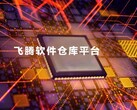Despite being the epicenter of the COVID pandemic, China and its economy are still rising steadily. The ascension appears to have been fueled even further by the U.S. trade sanctions, but the signals were clear years before that, when the Chinese smartphone producers took over the global market. At present, China is looking to reduce reliance on external markets, especially U.S. ones, and computer processors along with transistor fabrication capacity remain among the sectors that require a significant boost to compete with the consecrated companies in the West. However, according to a new DigiTimes report that highlights the comments of the Intel China Chair Rui Wang, the Chinese CPU makers could start to threaten Intel’s position in juist 3-5 years if developments continue at current pace.
The new report includes key citations from a Guancha.cn interview with Intel Corp’s SVP Rui Chang, who stated that “so far there has not been any local companies that are able to deal a substantial threat to Intel. But in 3-5 years, it will become clear that local companies will emerge as strong rivals." DigiTimes notes that, as of right now, China contributes more than 25% of Intel’s revenues. Wang is expecting some healthy competition in the coming years, but Intel will “exert its power to compete fairly” and remain in control.
DigiTimes reminds us that similar degrees of confidence were shown by the Chinese branch of IBM in the late 2000’s when local cloud computing and big data services started to rise to the challenge. Things did not go well for IBM, as Inspur, which has been receiving generous investments and subsidies from the Chinese government since 2009, announced in 2014 that it will take over IBM's business in China, replacing IBM servers used by local banks.
While the Chinese transistor fabrication sector is still playing catch-up to Intel’s and TSMC’s advanced technologies, there are quite a few capable CPU makers heavily subsidized by the local authorities. DigiTimes is grouping these into three distinct camps:
- Shanghai Zhaoxin Semiconductor and Hygon - two companies that are licensing X86 core tech especially from AMD
- Huawei's HiSilicon Kunpeng CPU and Phytium Technology in Tianjin - license the ARM instruction set architecture, but design in-house CPU cores
- Loongson and Sunway Microelectronic - develop proprietary instruction set architectures along with IP cores
Of all three camps, it looks like the last could evolve into a real threat for Intel, but this cannot happen without advanced transistor fabrication methods.



















